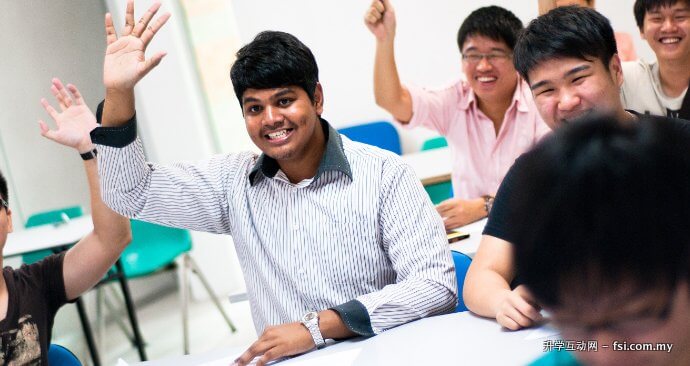
UNAS Secretary-General Yap Kwong Weng (left) presenting a gift to Datuk Lee Kim Shin, witnessed by Professor Ian Kerr and Beena Giridharan.
Miri – 18 March 2011 – The importance of social capital in ensuring environmental sustainability was the key message at the Sustainable Development and Leadership Forum 2011 held at Curtin University, Sarawak Malaysia (Curtin Sarawak) recently.
Themed ‘Let’s Act’, the one-day forum was jointly organised by Curtin Sarawak and the United Nations Association of Singapore (UNAS) for about 150 students of Curtin Sarawak and local secondary schools.
In his address to the participants, guest of honour Datuk Lee Kim Shin, Assistant Minister of Infrastructure Development and Communication and chairman of Curtin Sarawak’s management board, stressed the importance of sustainable development for the betterment of the community.
He highlighted the need for everyone to play their part, such as conserving energy and practicing the 3R’s (Reduce, Reuse, Recycle), to ensure climate change does not worsen in the future.
“The State government acknowledges the relevance of sustainable development. We have various policies and laws on sustainable development to safeguard not only our community but the environment as a whole,” said Datuk Lee.
In relation to social capital, Datuk Lee said it is an important aspect of community life. He cited the John Curtin Leadership Academy (JCLA), Curtin’s leadership programme that grooms students to be the leaders of the future, as a good example of promoting social leadership and volunteerism.
He also urged the forum participants to put their environmental awareness into practice to ensure continuous efforts are carried out to protect the environment.
The Secretary-General of UNAS, Yap Kwong Weng, meanwhile addressed the climate change issue that increasingly poses threats to mankind in his welcoming speech.
“Concrete action must be taken to tackle the problem because all living beings are greatly endangered by this major environmental crisis,” he cautioned.
Touching on social capital, Yap stated that now is the perfect time for all to collaborate to build social capital in conjunction with the United Nations International Year of Forests 2011. He said each individual must participate and collaborate to create social capital.
“Social capital, in turn, creates the ripple effect which can be exemplified by the spirit of volunteerism, one of the main values of social capital. When you volunteer, everyone will benefit from it, and furthermore, it empowers the local community,” explained Yap.
He also stated that the challenges faced by human beings cannot be solved unless people work together in a peaceful way.
Yap praised the local community for its staunch support towards Miri’s ‘No Plastic Bag campaign, adding that the city could be a role model for other cities to follow.
Five speakers from Singapore and Malaysia presented keynote papers during the forum. They were Dr Jude Chua Soo Meng (Assistant Professor of Philosophy, Policy and Leadership Studies Academic Group, National Institute of Education, Nanyang Technological University), Dr Tony See (Senior Lecturer and Degree Course Coordinator, Nanyang Academy of Fine Arts), Dr Mohammed Razi (Head of Human Resource and Volunteer Management, MERCY Malaysia), Beena Giridharan (Dean of the School of Foundation and Continuing Studies, Curtin Sarawak) and Dr Tang Fu Ee (Civil and Construction Engineering Senior Lecturer, School of Engineering and Science, Curtin Sarawak).
The topics of their papers covered ‘How To Think About Climate Change: It’s Not All Science’, ‘Sustainability, Sovereignty And Sorge: Towards A New Philosophy Of The Environment’, ‘Sustainability: The Wastewater Issue In Sarawak’, ‘Principles Of Community Service’ and ‘Social Leadership and Volunteerism’.
When asked for his feedback on the forum, Yap said he was convinced the participants thoroughly enjoyed themselves, judging from their engagement and enthusiastic responses.
“I believe they left the forum feeling empowered. More importantly, the forum has created an opportunity for students of different backgrounds to network together,” said Yap.
Beena, the event co-organiser, meanwhile said she hoped that forum was a rewarding experience for the students and that they would continue to volunteer and share their skills and knowledge with the Miri community.
“There is the possibility that these students will network and work together on future projects on sustainability and leadership. We have given them the chance to listen to diverse presenting styles and explore different subjects connected with the real world, and hopefully given them aspirations to pursue higher education,” added Beena.
The forum was organised by UNAS jointly with Curtin University to reach out to young people, especially students to develop in them the spirit of community and leadership qualities.
Also present at the event was the Pro Vice-Chancellor and Chief Executive of Curtin Sarawak, Professor Ian Kerr.











